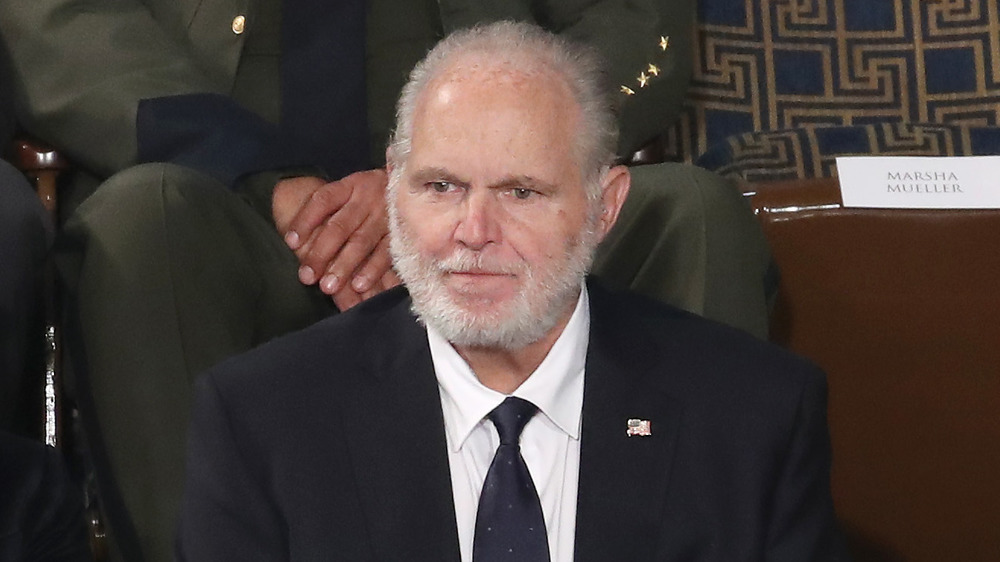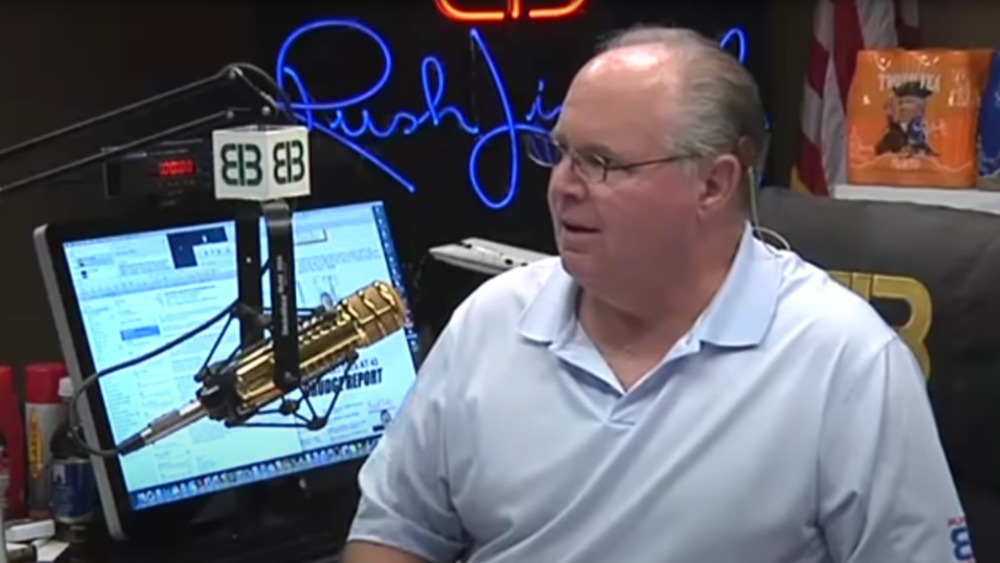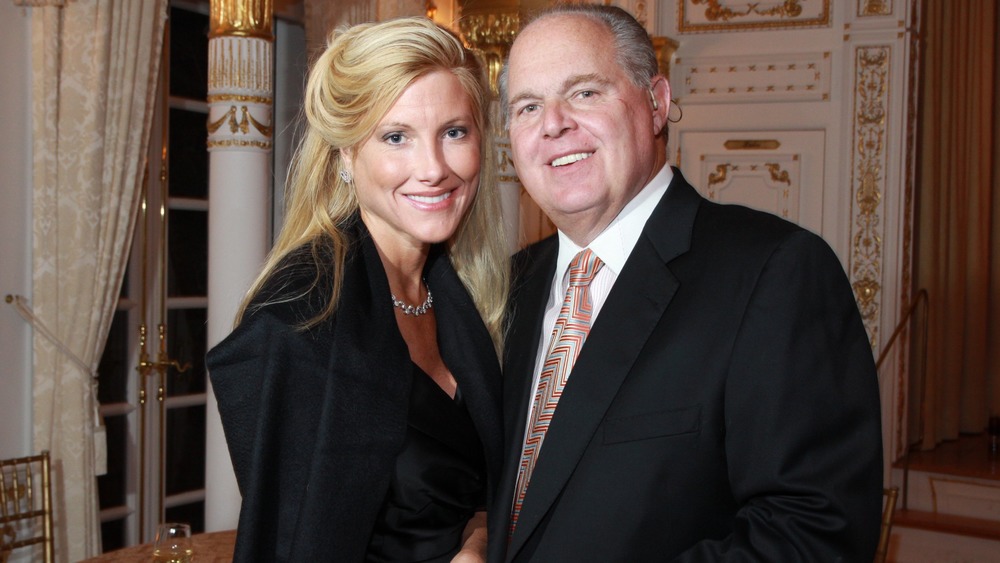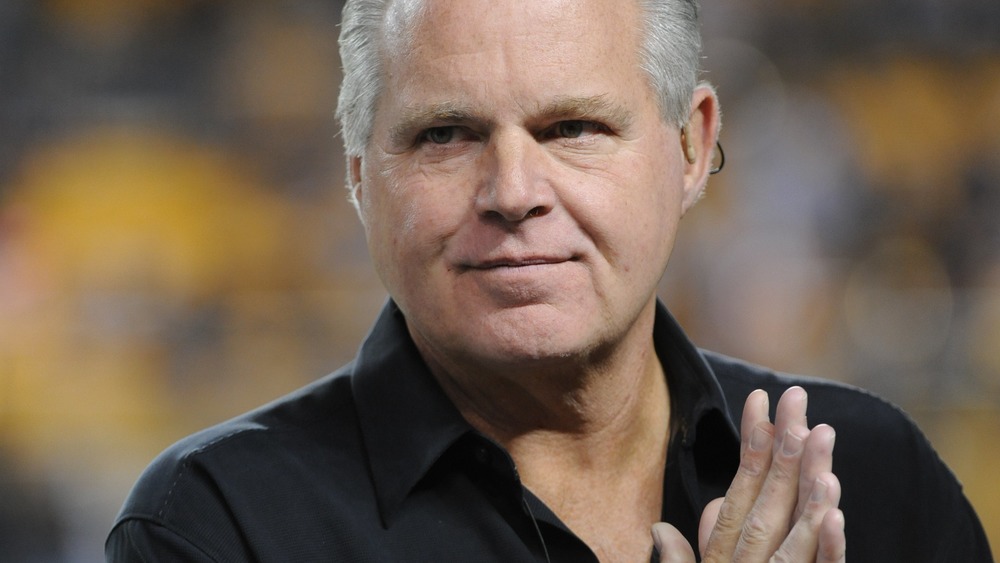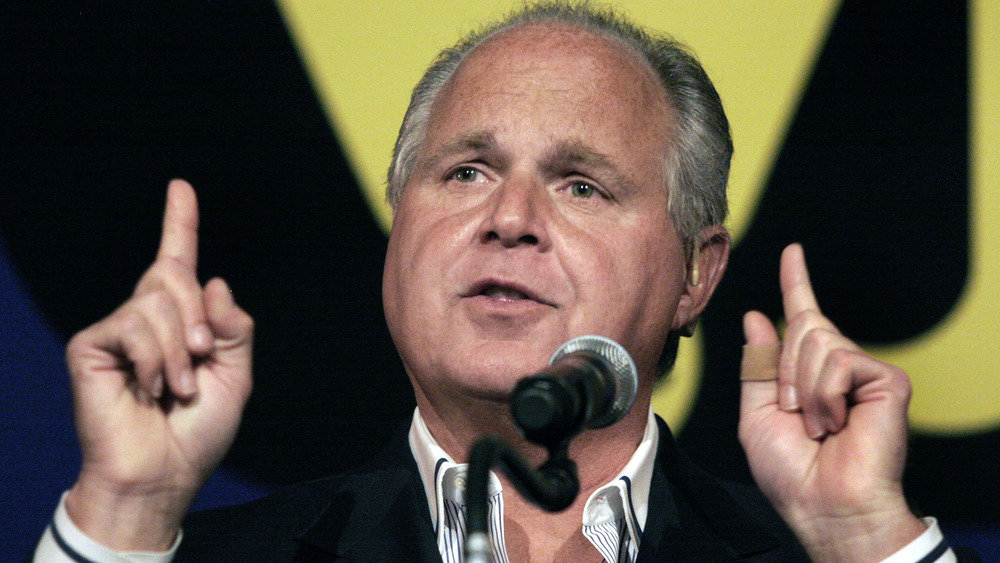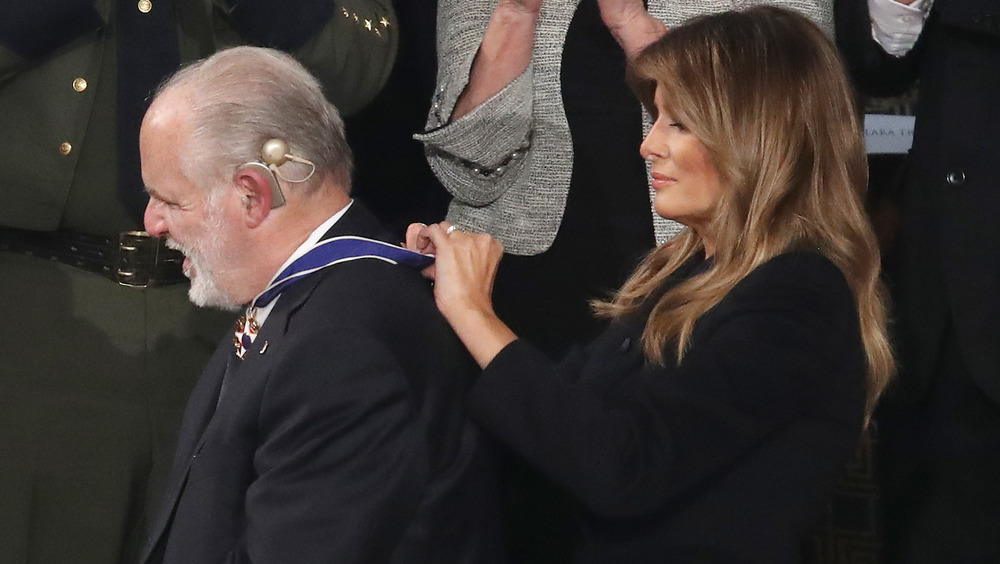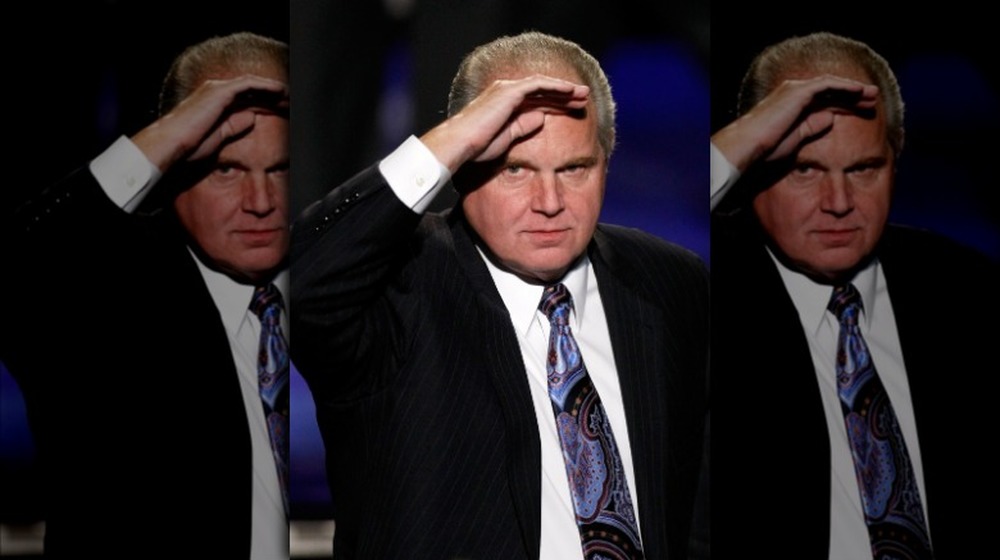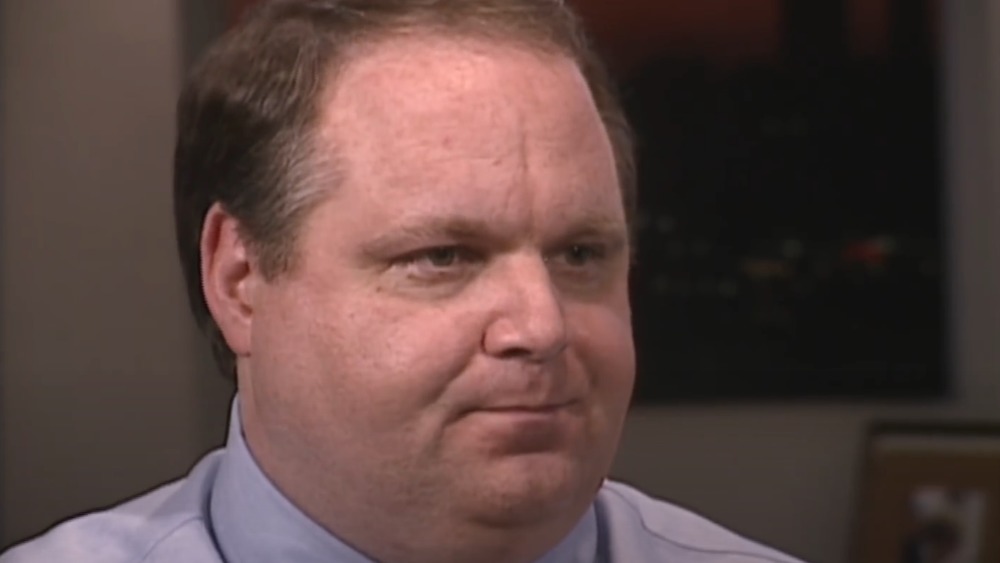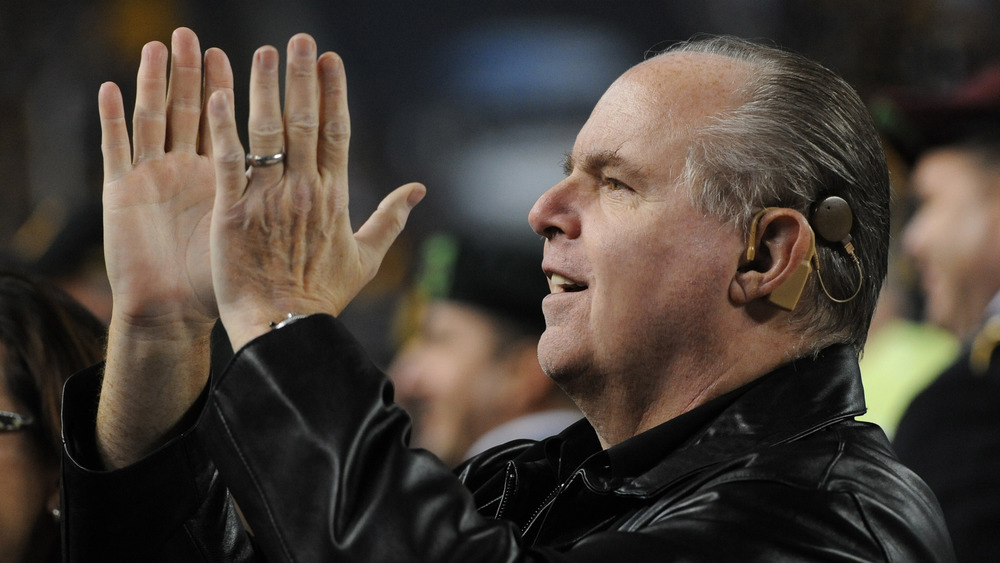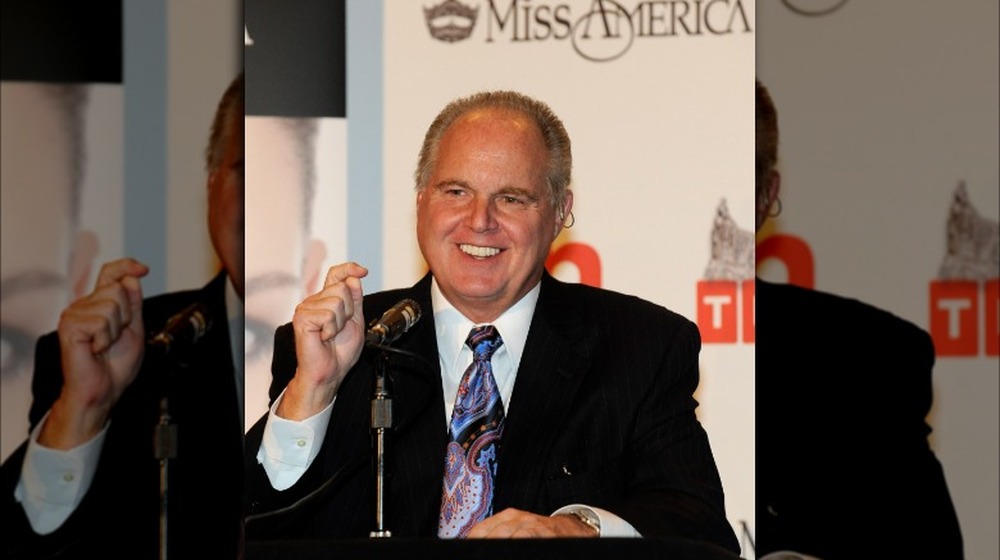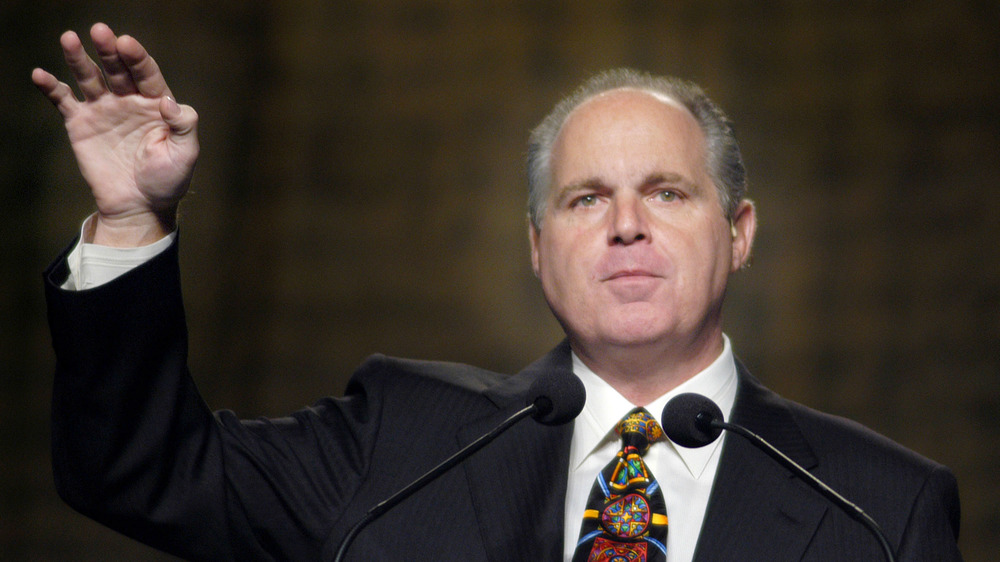The Untold Truth Of Rush Limbaugh
Rush Limbaugh's name is synonymous with controversy. For better or for worse, it's impossible to deny the profound mark he has left on American politics. Nearly a decade before FOX News premiered its "Fair and Balanced" right-leaning news network, Americans were introduced to conservative media by Rush Limbaugh's bombastic voice. His unique style of infotainment ushered in a new kind of conservatism — one that has been touted in recent years as being at "the heart of Trumpism." Limbaugh has frequently been named the most influential talk-radio host in America by Talkers and Newsmax, and the Rush Limbaugh Show has been the #1 rated syndicated talk show in America for approximately 30 years.
In 2020, Limbaugh made headlines for unexpected reasons. A longtime cigar smoker, Limbaugh announced in February 2020 that he has advanced lung cancer, later revealing his cancer is terminal. President Donald Trump surprised an emotional Limbaugh — just a few days after he revealed his cancer diagnosis — with the nation's highest honor, the Presidential Medal of Freedom, during his State of the Union speech.
No matter what you think about Limbaugh, the Radio Hall of Fame inductee has had a long and notorious career. We discovered information that explains Limbaugh's meteoric career rise and offers a glimpse into the life of a man Americans either love to hate — or whose purported hate they love.
He contributed to the lack of civil discourse in American politics
While the Republican Party focused on economic policy in the 1980s, Limbaugh spoke of populism, ridiculing the "isms" plaguing American society: feminism, racism, etc.— and listeners couldn't get enough. What Limbaugh offered was something new in the media landscape, which is a rare opportunity in the news industry. Brian Rosenwald writes in Talk Radio's America: How an Industry Took Over a Political Party That Took Over the United States that, when Limbaugh first graced the airwaves, "talk radio was not a partisan force, and it had no role in national politics."
Limbaugh's rise to notoriety had everything to do with timing. Republicans had regained political steam with Reagan's popularity, AM radio needed a new hook to lure listeners, and the Federal Communications Commission's (FCC) "fairness doctrine," which required media outlets to represent multiple viewpoints on controversial issues, was abolished. Enter Limbaugh, and his firebrand of combative, over-the-top infotainment.
One of the great ironies of this shock-jock's profound impact on American media is that the FCC's removal of the "fair and balanced" requirement opened the door to his openly-partisan rhetoric. That rhetoric created a demand for additional conservative media outlets, which opened the door for FOX News, which used the very requirement the FCC struck from the rule books, Fair and Balanced, as its (now-removed) slogan. Limbaugh's beliefs seeped into American political discourse and widened the chasm between conservative media and mainstream media outlets, which many conservatives now deem "fake news."
Rush Limbaugh runs with scissors at home, too
Rush Limbaugh married his current wife, Kathryn Rogers in 2010, and People reports Elton John performed at their wedding. The couple remains married as of this writing, and she accompanied Limbaugh to the 2020 State of the Union. Sadly, Limbaugh seems to have had a rough time in the love department in years past. In The Rush Limbaugh Story: Talent on Loan from God, an Unauthorized Biography (via the Seattle Times), Paul D. Colford writes that, following Limbaugh's amicable divorce from first wife Roxy Maxine McNeely (married 1977-1980), she said, "I don't see him married with kids. He devotes so much time and energy to what he does that there's nothing left for anyone else...Relationships are hard for Rush. People are hard."
But, he married again. His second marriage to Michelle Sixta Wennerholm (married 1982-1990) reportedly ended because his career was taking off, and she felt stifled and unable to advance in her own career, or — as The Rush Limbaugh Story describes — even able to enjoy a sunny day. Then came wife number three, Marta Maranda Fitzgerald (married 1994-2004). E! reports Limbaugh met Fitzgerald online in 1990 — long before internet dating was a thing. Their wedding was officiated by US Supreme Court Justice Clarence Thomas, and the marriage crumbled as Limbaugh was under investigation for drug charges.
Rush Limbaugh is a recovering opioid addict
Rush Limbaugh stunned fans when he revealed in October 2003 that he had been addicted to prescription painkillers for many years. The announcement came after Limbaugh's former housekeeper went public with details of his illegal activity "after a promise of immunity," per Deseret News. Limbaugh entered a five-week inpatient rehabilitation program for his addiction, which began following back surgery, and he continued to receive outpatient treatment after returning to work.
A criminal investigation resulted in charges being filed against him in 2006 for "doctor shopping," which means visiting more than one doctor to deceptively obtain multiple prescriptions for opioids or other addictive medications. CBS News reports that he was prescribed 2,000 painkillers in six months from four doctors — all filled at the same pharmacy. Prosecutors agreed to drop the charge if the radio host agreed to continue treatment.
Limbaugh had previously voiced disdain for drug use, saying on his show in 1995, "There's nothing good about drug use. We know it. It destroys individuals. It destroys families. Drug use destroys societies ... we know what happens to people in societies and neighborhoods, which become consumed by them. And so if people are violating the law by doing drugs, they ought to be accused and they ought to be convicted and they ought to be sent up" (via FAIR). One might think this experience would teach Limbaugh the lesson, "Judge not, lest ye be judged." But this is Limbaugh; judging is his brand.
Rush Limbaugh popularized the term 'liberal elite'
Ronald Reagan first used the term "elite" in a pejorative manner during a 1964 speech, A Time for Choosing. He said, "This is the issue of this election: whether we believe in our capacity for self-government or whether we abandon the American revolution and confess that a little intellectual elite in a far-distant capitol can plan our lives for us better than we can plan them ourselves." Various conservative pundits and politicians have used different combinations of words with "elite" in the years since Reagan's speech, but Rush Limbaugh — again thanks to his joining the media landscape at the right time — further popularized the term "liberal elite" and gave it wings by introducing it to his ever-growing audience. Perhaps being a college dropout gave him some added street cred in this realm.
The New York Times Magazine reported that the use of the term "liberal elite" has been "a favorite blood sport of the American right" since Limbaugh's career took flight in the late 80s. He consistently uses the term to convince his audience of "middle America's growing rejection of the elites." Limbaugh says Democratic party leaders are out of touch with the needs of "real Americans." Is it an effective message? If it weren't, Donald Trump would likely have lost the 2016 Presidential election. The Guardian reports it was the perceived smugness of liberal elites, especially those in the media, that pushed voters to Trump in 2016.
He would be completely deaf without his cochlear implants
Rush Limbaugh revealed to his listeners in 2001 that he had experienced rapid hearing loss and gone almost completely deaf in a matter of about five months. Doctors soon announced they had diagnosed him with autoimmune inner ear disease (AIED), which damaged both of his ears. AIED happens when the body's immune system mistakes normal ear tissue for something harmful (like a virus) and has an inflammatory reaction that ends up damaging the ear. There was public speculation that his addiction to painkillers had caused the hearing loss, but Salon reports Limbaugh's doctors at the House Ear Clinic maintain the cause of the hearing loss was AIED, though a UCLA neurotologist admitted painkiller-related hearing loss can present like AIED and be mistaken for it if the patient does not admit to drug use.
CBS News reported Limbaugh "used an elaborate setup at his South Florida studio involving transcribers and computer screens to read listeners' calls" after losing his hearing. But all hope was not lost! The shock-jock received his first cochlear implant in his left ear in December 2001 at House, and WND reported the surgery was a success. He received a second state-of-the-art cochlear implant in his right ear in 2014, per Newsmax.
Rush Limbaugh kept his tuchus out of Vietnam
While Rush Limbaugh openly supports aggressive military action, he sought deferments to avoid serving in Vietnam himself. It appears he allegedly managed to avoid the draft thanks to a pilonidal cyst on his backside. Limbaugh's first deferment, for students, expired when he dropped out of college. He was then drafted, shortly after becoming eligible. Instead of shipping out, though, Limbaugh's classification changed to 1-Y, which means he could only serve in the case of a national emergency or war.
The 1-Y was based on a physical ailment, and Selective Service System records (via Snopes) suggest Limbaugh's personal doctor submitted a report on his condition. Biographer Paul D. Colford says Limbaugh told him he received the 1-Y classification due to "an inoperable pilonidal cyst and a football knee from high school."
In 1992, ABC television's Jeff Greenfield interviewed Limbaugh (via Washington Post), where he said, "I had student deferments in college, and upon taking a physical, was discovered to have a physical — uh, by virtue of what the military says, I didn't even know it existed — a physical deferment." While Limbaugh has since hemmed and hawed when asked about the veracity of this story, Snopes concluded, "if there's an explanation for his draft status other than the cyst, he has yet to offer it."
Rush Limbaugh helped galvanize 'feminazis' back into activism
Georgetown University law student Sandra Fluke's testimony before a Congressional committee in February 2012 about her school's "conscience clause," which prevents Georgetown's health insurance plan for students and employees from covering oral contraceptives. Within days, Rush Limbaugh inserted himself into the story, insinuating Fluke had shared her own personal experiences when testifying, which was not true. Limbaugh said (via ABC News), "[Fluke] essentially says she must be paid to have sex — what does that make her? It makes her a slut, right? It makes her a prostitute. She wants to be paid to have sex."
Limbaugh went even further two days later, saying (via MediaMatters), "So, Ms. Fluke and the rest of you feminazis, here's the deal. If we are going to pay for your contraceptives, and thus pay for you to have sex, we want something for it, and I'll tell you what it is. We want you to post the videos online so we can all watch."
These comments ruffled so many female feathers that it was a catalyst for many women to embark upon women's rights activism. Limbaugh eventually posted an apology on his website reading, in part, "My choice of words was not the best, and in the attempt to be humorous, I created a national stir. I sincerely apologize to Ms. Fluke for the insulting word choices." Fluke wasn't having any of what he was selling and rejected the apology during an appearance on The View.
Rush Limbaugh seems boycott-bulletproof
As The Week reports, much of the public pressure that precipitated Rush Limbaugh's apology to Sandra Fluke and his "feminazis" tirade came in the way of advertiser boycotts. Money talks in media and advertising dollars are the backbone of the financial side of the industry. Eliminating advertisers hits the offender where it hurts the most.
Limbaugh was one of the first public figures to get the full-throttle social media boycott/cancel culture treatment, which was becoming increasingly effective at the time as social media grew to be a part of everyday life. Advertising Age columnist Simon Dumenco told BBC News, "this social media uprising and direct messaging to [Limbaugh's] advertisers I think tipped the scale in terms of him deciding to make one of his rare apologies. Social media has extended the momentum of the story."
While coordinated efforts to persuade Limbaugh's advertisers to jump ship were successful, he remained the number one syndicated radio talk show in America, and many advertisers wanted to reach his audience of millions of listeners per month. For that reason, the attempts to run Limbaugh off the air were ultimately unsuccessful, The Washington Post reports. Maybe one of the blessings of being inherently controversial is that making controversial comments doesn't get you canceled — or canned.
Rush Limbaugh has more dough than a donut factory
If counting his money isn't one of Rush Limbaugh's hobbies, he's seriously missing out. Forbes ranks him as #11 on their list of the World's Highest-Paid Celebrities, with an $85 million annual salary. He was the world's highest-paid radio host from 2008-2018, per Fox Business, but he was bested in 2018 by Howard Stern and is now #2. Limbaugh signed an out-of-this-world contract with radio giant iHeartMedia (then Clear Channel Communications) in 2008, amounting to $400 million over eight years. He extended the contract for an additional four years in 2016 and re-upped again at the beginning of 2020.
On the holdings side of things, Celebrity Net Worth says Limbaugh is worth a whopping $600 million, which includes a $26 million home on the water in West Palm Beach, Florida. His sprawling estate features a garage full of sports cars and a private jet.
Limbaugh also likes to raise and donate money for a good cause. He raised roughly $50 million in 26 years for the Leukemia & Lymphoma Society of America through his annual Cure-a-Thons from 1990-2016, per Fox News.
His radio career started when he was a teen
Rush Limbaugh has had a wild ride. We know him as the host of The Rush Limbaugh Show, but he has had many other adventures along the way. He started working in radio at age 16, spending mornings and afternoons at the local radio station. Limbaugh wanted to pursue a career in radio but was fired from three different radio stations before getting the gig at KFBK in Sacramento that shot him to stardom (via Britannica).
That's when the real bucking began. Limbaugh was a judge at the 2010 Miss America pageant. He has written several books, five of which are part of a series for young readers. Per The Atlantic, Pat Buchanan even claimed that during the 1992 Presidential campaign, Limbaugh was "a big help during the primary campaign," supporting Buchanan on air. The radio host had a great gig on ESPN's Sunday NFL Countdown show but resigned after making racially-charged comments that were deemed "insensitive and inappropriate" about Philadelphia Eagles Quarterback Donovan McNabb. For this transgression, as well as the legal troubles surrounding his painkiller addiction, Limbaugh was lampooned during the Weekend Update sketch on Saturday Night Live in October 2013. Ironically enough, back in 2007, he was nominated for a Nobel Peace Prize. How's that for an eclectic mix of activities?

